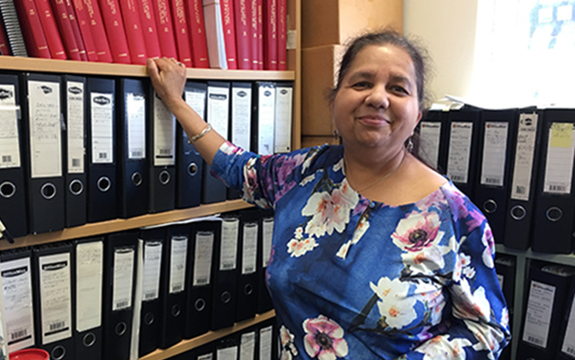Love for science leads to lifelong learning

In Summary
- Department Chair of Chemistry and Biotechnology, Professor Mrinal Bhave, credits her grandfather with sparking her interest in science
Department Chair of Chemistry and Biotechnology at Swinburne, Professor Mrinal Bhave, credits her grandfather with sparking her interest in science, when she was growing up in the Indian state of Karnataka.
“My grandfather was a strong influence on me. He was an inspector of primary schools in India and he used to live with us for half the year. He was a naturalist and an avid gardener who loved to teach and explain."
“I learned a lot of things from him at a very young age – I knew all the major stars and constellations that you can see in the northern skies by about the age of eight or ten.”
An interest grows
At the end of Year 12 Professor Bhave applied for and won a competitive National Science Talent Search scholarship.
“There were only 300 scholarships, which sounds like a lot, but not in India,” she says.
“I had to do a science project (among other things) at the end of Year 12, in order to compete for this scholarship.”
Over the summer vacation, she was able to study the effect of certain hormones on plants.
“I’m sure I stated something quite ridiculous that if you use certain hormones on these plants you could make the roots grow longer in desert conditions. When I was a bit older and wiser I realised that would cost a lot of money.”
The scholarship came with a commitment to maintain first-class marks every year during her Bachelor of Science and Master of Science studies, and to attend high-level laboratories during her summer study breaks.
“I spent a month each at the University of Delhi, Banaras Hindu University, and Tata Institute of Fundamental Research. These were really top-level labs with highly respected scientists doing fundamental research. It was absolutely amazing. Those were my formative years and I have not looked back since that time,” she says.
After completing her undergraduate degree at Karnataka University, she went to Pune University to do a Master of Science in botany with a specialisation in genetics and cytogenetics. Then she did her PhD research in biochemistry at the National Chemical Laboratory, Pune.
The path to Swinburne
“When I finished my PhD I was a ‘lab rat’ for many years, doing postdoc fellowships in the US, at the National Institutes of Health, and the University of Florida.”
After her husband was offered a job at the University of Melbourne in the Department of Chemistry, Professor Bhave successfully applied for a research post with the Murdoch Institute at the Royal Children’s Hospital in Melbourne, where she worked for three years.
“But there comes a juncture in your life when you think ‘How many years am I going to be standing up on my feet the whole day?”
She successfully applied for a job as a lecturer at Victoria University in 1993, then moved to Swinburne in response to ‘a tiny little ad in the newspaper’ in 2002.
“I needed a bit more inspiration and Swinburne had a lot of industry links and projects and seemed a bigger, more vibrant university,” she says.
“I think I’ve been happy every single day here. We all have minor ups and downs but I totally enjoy my job at Swinburne."
Major projects
Professor Bhave was tasked with establishing several subjects in the university’s new biotechnology program, alongside kicking off her own research applying molecular biology, biochemistry and biotechnology techniques to agricultural and environmental issues.
In the course of studying the quality of grains, such as wheat and barley, Mrinal decided to focus on a peptide that can kill bacteria.
“That has become a major focus of my work and I am working with Professors Enzo Palombo, Peter Kingshott and Andrew Clayton on developing this area for a number of applications including new treatments for antibiotic-resistant organisms.
“We are investigating these peptides, studying how they bind to bacterial cells, to see if they have an effect on the multi-drug resistant organisms.
“That’s very challenging biochemistry and cell biology – but it’s fantastic!”

